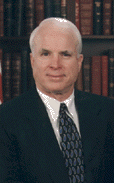
McCain
Sen. McCain Proposes Large Scale Expansion of H1B Program
(August 22, 1999) Sen. John McCain, while on a Presidential campaign swing through California, stated that he supports a "large-scale expansion of the H1-B program". There are several bills pending in the Congress that would increase the annual cap on H1B visas, and/or create a new visa class for aliens receiving high tech degrees from U.S. universities. Sen. McCain also proposed more funding for training math and science teachers, and making permanent the three year moratorium on new Internet taxes.
| Related Pages |
| Text of McCain Speech, 8/19/99. |
| Summary of Bills Pertaining to Visas for High Tech Workers. |
"There are other bills in Congress that would increase the cap on these visas," Sen. McCain told the Commonwealth Club of California on August 19. "But I say that we should eliminate these artificial limits altogether, and allow the technology industry's leaders to work with the Department of Labor to set an appropriate level of visas to meet their needs each year."
He also called for a "scholarship and grant program for young people who decide to pursue careers as math and science teachers" to train Americans for high tech jobs.
Sen. John McCain (R-AZ) is a candidate for the Republican nomination for President. He is also the Chairman of the Senate Commerce Committee. However, H1B visa bills fall within the jurisdiction of the Judiciary Committee, and its Immigration Subcommittee, and the Finance Committee.
Sen. Spencer Abraham (R-MI), the Chairman of the Immigration Subcommittee, led the fight in the Senate last year for an increase in the H1B visa cap. He is facing a tough re-election contest against Rep. Debbie Stabenow (D-MI) in the 2000 Michigan Senatorial race.
 |
|
| Sen. John McCain |
"Last year, Congress passed a bill increasing the number of technology-trained workers who could immigrate here legally from other countries," said Sen. McCain. "The White House fought us tooth and nail - so the bill we finally passed was a half-measure at best, and the technology industries have already reached their hiring limits for this year."
"Now think about the lunacy of this: we're a country that has been built on the strength and benefits of legal immigration. The technology industries are the driving force behind one of the largest economic expansions in history. And the politicians are working as hard as we can to keep them from hiring the people they need to keep this growth and progress going."
"I was a strong supporter of the H1-B expansion last year, but it's not enough."
Currently, there is a pair of bills pending in the Congress that would raise the annual cap on H1B visas. S 1440 IS, sponsored by Sen. Phil Gramm (R-TX), and HR 2698 IH, sponsored by Rep. David Dreier (R-CA), would raise the annual cap on H1B visas to 200,000 for each of the fiscal years 2000, 2001, and 2002.
These companion bills, which are titled the New Workers for Economic Growth Act, would also provide that the annual numerical limitations would not include two types of H1B visas: (1) H1B visas issued to anyone who "has attained a master's degree or higher (or its equivalent) in a specialty related to the intended employment and receives wages (including cash bonuses and similar compensation) at an annual rate equal to at least $60,000", or (2) "has attained a bachelor's degree or higher degree (or its equivalent) and is employed (or has received an offer of employment) at an institution of higher education".
There is also a bill (HR 2687 IH), sponsored by Rep. Zoe Lofgren (D-CA), which would not increase the cap on H1B visas, but would establish a 5 year pilot program to issue 5 year work visas to certain aliens already in the U.S. with an F or J student visa. To be eligible the alien must have obtained a post-secondary degree in math, science, engineering, or computer science from an American university in the last 90 days, and have a binding job offer that pays at least $60,000.
It would create a new category of non-immigrant visa, the T-visa.
|
Sen. McCain continued that "the long-term answer to this worker shortage is the education of our own young people. No matter how receptive we are to the arrival of legal immigrants from other countries, the technology industries are expanding far too rapidly for us to rely on others to meet these needs."
"So I am also calling for the establishment of a scholarship and grant program for young people who decide to pursue careers as math and science teachers. Our kids are smart enough to compete in the technology economy, but they need the right education and the right training. They've got to have access to quality instruction. They've got to have access to qualified teachers. Let's make sure they get it."
|
Sen. McCain also used the occasion to address Internet taxation. "A three-year moratorium on Internet taxes is a good start, but it's just a start," said Sen. McCain. "I want to expand the Internet Tax Freedom Act into a permanent ban on Internet taxation. This was the original goal, and I intend to work to make sure that goal is achieved."
"Internet commerce has helped fuel one of the strongest economic
expansions in history," said Sen. McCain. "The Internet should be the
ultimate free-trade, tax-free marketplace. If I am elected President, I pledge
to you that I'll make sure it stays that way."
| Related H1B Stories |
| House Subcommittee Hearing on H1B Fraud,
5/6/99. Rep. Smith Urges INS To Fight H1B Fraud, 5/28/99. Gramm to Introduce Bill to Raise H1B Visa Cap, 6/3/99. Gramm Introduces Bill to Raise H1B Visa Cap, 8/4/99. Rep. Lofgren Introduces High-Tech Visa Bill, 8/5/99. Immigration Subcommittee Examines H1B Visas, 8/8/99. |